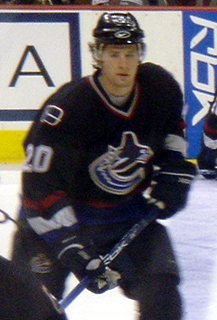Ryan Kesler facts for kids
Quick facts for kids Ryan Kesler |
|||
|---|---|---|---|
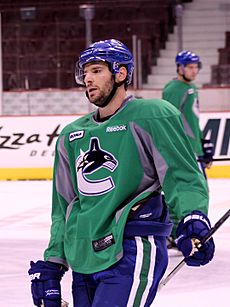
Kesler with the Vancouver Canucks in March 2012
|
|||
| Born | August 31, 1984 Livonia, Michigan, U.S. |
||
| Height | 6 ft 2 in (188 cm) | ||
| Weight | 202 lb (92 kg; 14 st 6 lb) | ||
| Position | Center | ||
| Shot | Right | ||
| Played for | Vancouver Canucks Anaheim Ducks |
||
| National team | |||
| NHL Draft | 23rd overall, 2003 Vancouver Canucks |
||
| Playing career | 2003–2019 | ||
Ryan James Kesler (born August 31, 1984) is an American former professional ice hockey player. He played as a center. Ryan was picked 23rd overall by the Vancouver Canucks in the 2003 NHL Entry Draft. He played for the Canucks for 10 years.
In 2014, he was traded to the Anaheim Ducks and played there for the rest of his career. Ryan was known as a two-way forward. This means he was great at both scoring goals and playing defense. He also had an "agitating" style, which means he liked to get under the skin of his opponents.
Ryan won the Selke Trophy in 2011. This award goes to the best defensive forward in the National Hockey League (NHL). He was also a finalist for this award in 2009, 2010, 2016, and 2017.
Before joining the NHL, Ryan played junior ice hockey for the USA Hockey National Team Development Program. He then played college ice hockey for the Ohio State Buckeyes. He was named CCHA Rookie of the Week three times. Ryan also played for the Manitoba Moose in the American Hockey League (AHL). He was chosen for the 2005 AHL All-Star Game.
Ryan has also played for the United States in seven international hockey events. He won a gold medal at the World U18 Championship. He also won gold at the World Junior Championship. He earned a silver medal at the Winter Olympics. Plus, he won a gold medal at the World U-17 Hockey Challenge.
Contents
Ryan's Early Life and Hockey Start
Ryan Kesler was born on August 31, 1984, in Livonia, Michigan. His parents are Linda and Mike Kesler. He is the youngest of three children. His dad, Mike, played college ice hockey and introduced Ryan to skating around age four. Mike also coached a Junior B team and ran a hockey school. Ryan attended this school every summer from age six to seventeen.
Ryan played minor ice hockey in Detroit. He played for teams like Compuware and Little Caesars. He even played in the 1998 Quebec International Pee-Wee Hockey Tournament. When he was about 13, Ryan was cut from every top team he tried out for. So, he played for his dad's team, the Livonia Hockey Association bantam team. Ryan says his older brother helped him get into hockey. He also became good friends with Chris Conner, who later played in the NHL.
Even though he grew up near Detroit, Ryan was a fan of the Minnesota North Stars. He looked up to North Stars center Mike Modano, who was also from Livonia. He also admired Joe Sakic of the Quebec Nordiques and Colorado Avalanche.
Ryan's Hockey Journey
Starting His Career
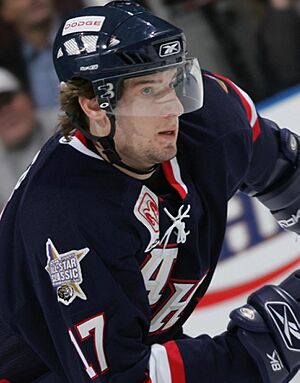
In June 2000, Ryan was drafted by the Brampton Battalion in the Ontario Hockey League (OHL). But he chose to play for the USA Hockey National Team Development Program (USNTDP). This program was close to his home in Livonia. He played two seasons with the USNTDP, scoring 99 points in 131 games.
After that, Ryan got a scholarship to play college ice hockey at Ohio State University. He chose Ohio State because it was closer to home. In his first year, he scored 11 goals and 20 assists. He helped the Buckeyes finish third in their league. Ryan was recognized for his great play as a freshman. He was named CCHA Rookie of the Week three times.
After his freshman year, Ryan was ranked 16th among North American skaters for the 2003 NHL Entry Draft. On June 21, 2003, the Vancouver Canucks drafted him 23rd overall.
Ryan signed a three-year contract with the Canucks in August 2003. After training camp, he was sent to the Canucks' minor league team, the Manitoba Moose.
Playing in the NHL
Vancouver Canucks Years (2003–2014)
Ryan started his professional career with the Manitoba Moose. But he was called up by the Canucks in November 2003. He made his NHL debut on November 24, 2003. He scored his first NHL goal on November 29 against the Calgary Flames. For his first season, Ryan split his time between the Canucks and the Moose.
The 2004–05 NHL lockout meant the entire 2004–05 NHL season was canceled. So, Ryan played the whole season with the Moose. He became one of the Canucks' top young players. He was named to the AHL All-Star team. Ryan finished third in scoring for the Moose with 30 goals and 57 points. He was named the Moose's Most Valuable Player.
When the NHL started playing again in the 2005–06 season, Ryan joined the Canucks full-time. He played in all 82 games and scored 23 points.
In 2006, Ryan signed a one-year contract with the Philadelphia Flyers. But the Canucks matched the offer, so he stayed with Vancouver. In January 2007, Ryan got a hip injury and missed the rest of the season. He returned for the 2007 playoffs but broke his finger in the first game. The Canucks won that series but lost in the next round.
In May 2007, the Canucks signed Ryan to a new three-year contract. In the 2007–08 season, Ryan became a strong two-way center. He scored a career-high 21 goals and 16 assists for 37 points. He often played against the other team's best players.
For the 2008–09 season, Ryan was named an alternate captain for the Canucks. He started playing in a more offensive role. He set new personal bests with 26 goals and 33 assists for 59 points. He won the Cyclone Taylor Award as the team's MVP. He was also a finalist for the Frank J. Selke Trophy.
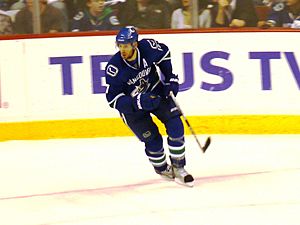
In March 2010, Ryan signed a six-year, $30 million contract extension with the Canucks. He had another great season in 2009–10, scoring 25 goals and 50 assists for 75 points. He was a Selke Trophy finalist again.
For the 2010–11 season, Ryan's offensive role grew even more. He started playing on the power play with the Sedin twins. He scored his 100th NHL goal in November 2010. He got his first career hat-trick in December. In January 2011, he was named to his first NHL All-Star Game. Ryan finished the season with a career-high 41 goals and 32 assists for 73 points. His 41 goals tied for the team lead. The Canucks won their first Presidents' Trophy as the best regular season team.
In the 2011 playoffs, Ryan was a key player. He led the team in scoring against the Nashville Predators. He helped the Canucks reach the Stanley Cup Finals. During the playoffs, he played with a hip injury that was not revealed until later. The Canucks lost the Finals in seven games to the Boston Bruins. After the season, Ryan won the Selke Trophy.
In the 2011 off-season, Ryan had surgery on his hip. He returned to play in October 2011. He played his 500th NHL game in November. He finished the 2011–12 season with 22 goals and 27 assists for 49 points. The Canucks won their second straight Presidents' Trophy. However, they lost in the first round of the 2012 playoffs.
After the 2012 playoffs, it was revealed Ryan had been playing with a torn shoulder. He had surgery in May. He also had wrist surgery in June. Due to these injuries and a lockout, he only played 17 games in the 2012–13 season. He also broke his foot during this time. The Canucks made the playoffs but were swept in the first round.
The 2013–14 season saw many changes for the Canucks. They missed the playoffs for the first time in a while. In February 2014, Ryan injured his hand blocking a shot during the 2014 Winter Olympics. He finished the tournament but missed some Canucks games. He ended the season leading the team with 25 goals.
Anaheim Ducks Years (2014–2019)
On June 27, 2014, Ryan was traded to the Anaheim Ducks. He scored his 200th career goal in March 2015. He finished the 2014–15 season with 47 points. The Ducks were the top team in the Western Conference. Ryan helped them reach the Western Conference Finals in the 2015 playoffs. They lost in seven games to the Chicago Blackhawks.
In July 2015, Ryan signed a six-year contract extension with the Ducks. In October, he was named an alternate captain for the team. He finished third in Selke Trophy voting in the 2015–16 season. He had 53 points that season. The Ducks lost in the first round of the 2016 playoffs.
On January 1, 2017, Ryan recorded his fourth career hat-trick. He had 22 goals and 36 assists for 58 points in the 2016–17 season. He helped the Ducks reach the Western Conference Finals again in the 2017 playoffs. They lost to the Nashville Predators. He was also a Selke Trophy finalist again.
Ryan missed the first 37 games of the 2017–18 season due to hip surgery. He returned in December 2017. He played 44 games and had 14 points. The Ducks were swept in the first round of the 2018 playoffs.
On March 5, 2019, Ryan played his 1,000th NHL game. This is a huge milestone for a hockey player. He finished the 2018–19 season with 8 points. The Ducks missed the playoffs that year.
In May 2019, Ryan had hip surgery. He missed the entire 2019–20 season. He was also diagnosed with Crohn's disease, a health condition. He did not play in the NHL after the 2018-19 season.
Playing for Team USA
| Medal record | ||
|---|---|---|
| Ice hockey | ||
| Representing |
||
| Winter Olympics | ||
| Silver | 2010 Vancouver | |
| World Junior Championships | ||
| Gold | 2004 Helsinki | |
| World U18 Championships | ||
| Gold | 2002 Piešťany | |
Ryan Kesler has played for the United States in many international hockey tournaments.
He first played internationally at the World U-17 Hockey Challenge in 2001. He helped the American team win a gold medal.
Ryan played in his first International Ice Hockey Federation event at the 2002 IIHF World U18 Championships. He scored seven points and helped the U.S. win their first U18 title. He was named the Best Player of the tournament.
He also played in the 2003 World Junior Ice Hockey Championships. He was second in team scoring with seven points.
In December 2003, Ryan played in his second 2004 World Junior Ice Hockey Championships. He scored two goals as the U.S. team went undefeated. They beat Canada in the gold medal game to win their first IIHF World U20 Championship. Ryan scored the game-tying goal in that final game.
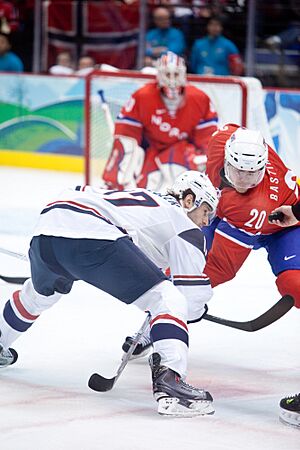
Ryan was chosen for the American team at the 2010 Winter Olympics in Vancouver. In a game against Canada, Ryan scored an empty-net goal to secure a 5–3 win. In the gold medal game rematch, Ryan scored a goal to cut Canada's lead. The U.S. team eventually lost in overtime and won the silver medal.
Ryan was also part of the U.S. team for the 2014 Winter Olympics. He injured his hand blocking a shot against Russia. But he kept playing through the tournament. The U.S. team finished fourth.
Ryan's Playing Style
Ryan Kesler was known as a two-way forward. This means he was good at both offense and defense. Early in his career, he was a "shutdown" forward. He played on the penalty kill and against the other team's best players. He also had a reputation as an agitator. He would talk to and physically challenge opponents.
As his career went on, Ryan added more offense to his game. He became a strong scorer while still being responsible defensively. He was known for his speed and powerful wrist shot. He was also good at winning faceoffs. On the penalty kill, he would block many shots. On the power play, he used his size to stand in front of the net. This helped him screen the goalie or deflect shots.
Ryan's success came from his competitive spirit. He always wanted to outwork his opponents. He learned to control his emotions better as he got older. He also said being a father made him want to set a good example for his children.
Ryan's Life Off the Ice
Ryan Kesler and his wife Andrea have four children. They live in Huntington Beach, California during the hockey season. In the off-season, they live in Bloomfield, Michigan.
Endorsements and Clothing Line
In March 2010, Ryan was featured on the cover of the video game NHL 2K11. He had also helped with the motion capture for NHL 2K10.
In November 2010, Ryan launched his own line of sportswear and casual clothes. It was called "RK17."
Career Statistics
Regular season and playoffs
| Regular season | Playoffs | |||||||||||||
|---|---|---|---|---|---|---|---|---|---|---|---|---|---|---|
| Season | Team | League | GP | G | A | Pts | PIM | GP | G | A | Pts | PIM | ||
| 1999–2000 | Detroit Honeybaked | MWEHL | 72 | 44 | 73 | 117 | — | — | — | — | — | — | ||
| 2000–01 | US NTDP U18 | USDP | 26 | 8 | 20 | 28 | 24 | — | — | — | — | — | ||
| 2000–01 | US NTDP U18 | NAHL | 56 | 7 | 21 | 28 | 40 | — | — | — | — | — | ||
| 2001–02 | US NTDP U18 | USDP | 46 | 11 | 33 | 44 | 23 | — | — | — | — | — | ||
| 2001–02 | US NTDP Juniors | USHL | 13 | 5 | 5 | 10 | 10 | — | — | — | — | — | ||
| 2001–02 | US NTDP U18 | NAHL | 10 | 5 | 6 | 11 | 4 | — | — | — | — | — | ||
| 2002–03 | Ohio State Buckeyes | CCHA | 40 | 11 | 20 | 31 | 44 | — | — | — | — | — | ||
| 2003–04 | Manitoba Moose | AHL | 33 | 3 | 8 | 11 | 29 | — | — | — | — | — | ||
| 2003–04 | Vancouver Canucks | NHL | 28 | 2 | 3 | 5 | 16 | — | — | — | — | — | ||
| 2004–05 | Manitoba Moose | AHL | 78 | 30 | 27 | 57 | 105 | 14 | 4 | 5 | 9 | 8 | ||
| 2005–06 | Vancouver Canucks | NHL | 82 | 10 | 13 | 23 | 79 | — | — | — | — | — | ||
| 2006–07 | Vancouver Canucks | NHL | 48 | 6 | 10 | 16 | 40 | 1 | 0 | 0 | 0 | 0 | ||
| 2007–08 | Vancouver Canucks | NHL | 80 | 21 | 16 | 37 | 79 | — | — | — | — | — | ||
| 2008–09 | Vancouver Canucks | NHL | 82 | 26 | 33 | 59 | 61 | 10 | 2 | 2 | 4 | 14 | ||
| 2009–10 | Vancouver Canucks | NHL | 82 | 25 | 50 | 75 | 104 | 12 | 1 | 9 | 10 | 4 | ||
| 2010–11 | Vancouver Canucks | NHL | 82 | 41 | 32 | 73 | 66 | 25 | 7 | 12 | 19 | 47 | ||
| 2011–12 | Vancouver Canucks | NHL | 77 | 22 | 27 | 49 | 56 | 5 | 0 | 3 | 3 | 6 | ||
| 2012–13 | Vancouver Canucks | NHL | 17 | 4 | 9 | 13 | 12 | 4 | 2 | 0 | 2 | 0 | ||
| 2013–14 | Vancouver Canucks | NHL | 77 | 25 | 18 | 43 | 81 | — | — | — | — | — | ||
| 2014–15 | Anaheim Ducks | NHL | 81 | 20 | 27 | 47 | 75 | 16 | 7 | 6 | 13 | 24 | ||
| 2015–16 | Anaheim Ducks | NHL | 79 | 21 | 32 | 53 | 78 | 7 | 4 | 0 | 4 | 0 | ||
| 2016–17 | Anaheim Ducks | NHL | 82 | 22 | 36 | 58 | 83 | 17 | 1 | 7 | 8 | 32 | ||
| 2017–18 | Anaheim Ducks | NHL | 44 | 8 | 6 | 14 | 46 | 4 | 0 | 2 | 2 | 6 | ||
| 2018–19 | Anaheim Ducks | NHL | 60 | 5 | 3 | 8 | 44 | — | — | — | — | — | ||
| NHL totals | 1,001 | 258 | 315 | 573 | 920 | 101 | 24 | 41 | 65 | 133 | ||||
International
| Year | Team | Event | Result | GP | G | A | Pts | PIM | |
|---|---|---|---|---|---|---|---|---|---|
| 2002 | United States | WJC18 | 8 | 2 | 5 | 7 | 4 | ||
| 2003 | United States | WJC | 4th | 7 | 3 | 4 | 7 | 6 | |
| 2004 | United States | WJC | 6 | 3 | 0 | 3 | 6 | ||
| 2006 | United States | WC | 7th | 7 | 0 | 1 | 1 | 0 | |
| 2010 | United States | OG | 6 | 2 | 0 | 2 | 2 | ||
| 2014 | United States | OG | 4th | 6 | 1 | 3 | 4 | 0 | |
| 2016 | United States | WCH | 7th | 3 | 0 | 0 | 0 | 4 | |
| Junior totals | 21 | 8 | 9 | 17 | 16 | ||||
| Senior totals | 22 | 3 | 4 | 7 | 6 | ||||
Awards and Achievements
International Awards
League Awards
|
Team Awards
|
Images for kids
 | Aurelia Browder |
 | Nannie Helen Burroughs |
 | Michelle Alexander |


